Unit 23 Sentence Stress II
WordStressandSentenceStress重音是英语发音的关键环节
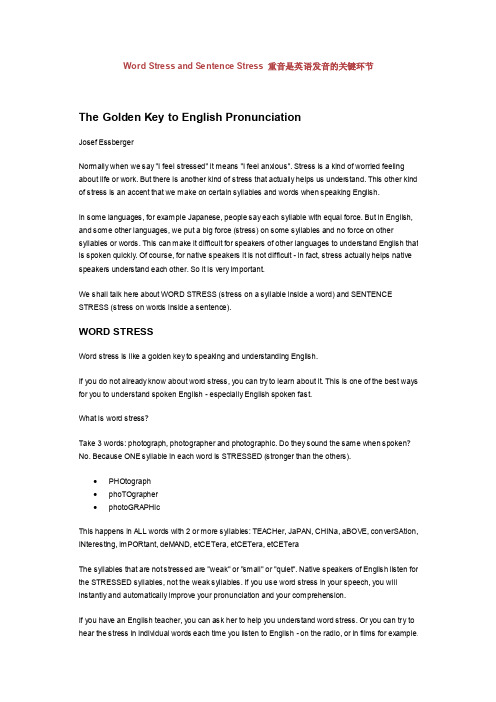
Word Stress and Sentence Stress 重音是英语发音的关键环节The Golden Key to English PronunciationJosef EssbergerNormally when we say "I feel stressed" it means "I feel anxious". Stress is a kind of worried feeling about life or work. But there is another kind of stress that actually helps us understand. This other kind of stress is an accent that we make on certain syllables and words when speaking English.In some languages, for example Japanese, people say each syllable with equal force. But in English, and some other languages, we put a big force (stress) on some syllables and no force on other syllables or words. This can make it difficult for speakers of other languages to understand English that is spoken quickly. Of course, for native speakers it is not difficult - in fact, stress actually helps native speakers understand each other. So it is very important.We shall talk here about WORD STRESS (stress on a syllable inside a word) and SENTENCE STRESS (stress on words inside a sentence).WORD STRESSWord stress is like a golden key to speaking and understanding English.If you do not already know about word stress, you can try to learn about it. This is one of the best ways for you to understand spoken English - especially English spoken fast.What is word stress?Take 3 words: photograph, photographer and photographic. Do they sound the same when spoken? No. Because ONE syllable in each word is STRESSED (stronger than the others).∙PHOtograph∙phoTOgrapher∙photoGRAPHicThis happens in ALL words with 2 or more syllables: TEACHer, JaPAN, CHINa, aBOVE, converSAtion, INteresting, imPORtant, deMAND, etCETera, etCETera, etCETeraThe syllables that are not stressed are "weak" or "small" or "quiet". Native speakers of English listen for the STRESSED syllables, not the weak syllables. If you use word stress in your speech, you will instantly and automatically improve your pronunciation and your comprehension.If you have an English teacher, you can ask her to help you understand word stress. Or you can try to hear the stress in individual words each time you listen to English - on the radio, or in films for example.Your first step is to HEAR and recognise it. After that, you can USE it.Two important rules about word stress:1. One word, one stress2. The stress is always on a vowelSENTENCE STRESSSentence stress is another golden key for speaking and understanding English. With sentence stress, some words in a sentence are STRESSED (loud) and other words are weak (quiet). Look at the following sentence:We want to go.Do we say every word with the same stress or force? No. We make the important words BIG and the unimportant words small. What are the important words in this sentence? Yes, that's right: WANT and GO.∙We WANT to GO.∙We WANT to GO to WORK.∙We DON'T WANT to GO to WORK.∙We DON'T WANT to GO to WORK at NIGHT.Now that you know that word stress exists, you can try to learn more about it.You should KNOW that SENtence and WORD STRESS are VERy imPORtant1998 Josef Essberger。
sentence_stress 英语重音解析

句子重音
Sentence stress — stressed words and unstressce stress is the relative degree of force given to different words in a sentence.
General rules for sentence stress — what to stress in a sentence?
*In an English utterance, content words / information words are generally stressed while function words are unstressed. *In general, stressed words give information to the listener and unstressed words join the information words together. *If you stress all the words in an utterance, you may sound unpleasant or even cause misunderstanding because you are giving too much information, and English speakers usually stress all words only when they are impatient, angry, or very serious. *Correct pronunciation of stressed and unstressed words is thus extremely important for effective communication in English.
新概念英语第二册L23剖析

02 03
Rich cultural context
The text incorporates a wealth of cultural background information, allowing learners to gain a deeper understanding of Western culture and society.
02
Vocabulary and Phrase Analysis
Key vocabulary explanation
01
Vocabulary List
04
Word Explanations
02
L23 specific words: include, consist, involve, comprise, etc.
Splitting Techniques
Learn how to split long and complex sentences into shorter, more manageable ones while preserving the original meaning.
Reorganizing for Clarity
Rearrange the split sentences in a logical order to enhance readability and comprehension.
Exploration of Translation Strategies for Long and Difficult Sentences
Understanding sentence meanings in context
Contextual
新概念青少版2BUnit 23 Quite tall--- and quite striking!

Unit 23 Quite tall--- and quite striking!一:Teaching aims:1.how tall/high/wide/deep/long/heavy is that---?2.What’s the height/width/depth/length/weight of that?3.It’s 320 meters. It’s 320 metres wide. It’s 320 metres deep4.How far is it from A to B? It’s near/quite a long way./ it is’t far. It’s a long way. It’s 320 miles.5.Pay attention to the usage of quite/about/very and so on.6.Put a high value on the transformation of statements,simple questions,and Wh-questions.二:Teaching procedures and strategies.1.how 后面通常加形容词和副词,而what 后面则加名词。
例如:How beautifu l the flower is!= what a beautiful flower! (it is) How fast he runs! 试着用what和how翻译:多么热的夏夜!_________________________________ !____________________________________ !How tall is sth= what height is sth2.常见的程度副词quite、very 和about。
如quite tired, quite old, quite ill, quite striking。
新概念英语第二册Lesson23(共5PPT) (2)

CHAPTER
Grammar Focus
Definition
The past continuous tense is used to express an action that was ongoing in the past at a specific time.
Formation
The past continuous tense is formed by using the "was" or "were" of the verb "to be" with the -ing form of the main verb. For example, "He was running" or "They were playing."
Time reference
The past continuous tense is used to show an action that was happening at a particular moment in the past or during a specific period of time in the past.
The fourth slide provides examples of successful language learners and their experiences, emphasizing that anyone can learn a new language with effort and dedication.
总结词
本课中包含了许多常用的表达方式,如习语、短语、固定搭配等,学习者需要认真积累这些表达方式,以提高英语表达的准确性和流畅性。
英语语音重读sentence-stressPPT优秀课件

Sentence Stress (句子重音)
7. The stressing of the adverb “there”: unstressed in “there to be”:
The house has many rooms and there is a lovely garden.
8. The stressing of conjunctions with an emphatic meaning: conjunctions with an emphatic meaning are usually stressed:
*In general, stressed words give information to the listener and unstressed words join the information words together.
*If you stress all the words in an utterance, you may sound unpleasant or even cause misunderstanding because you are giving too much information, and English speakers usually stress all words only when they are impatient, angry, or very serious.
the city
8
Sentence Stress (句子重音)
B — I’m going to the library. Would you like to come too, Pat? — I’m sorry, but I have to work in the lab. I have to finish my report. — Oh, I see. Are you going now? — I’ll be ready in a few minutes. C — Are you taking a vacation this summer, Linda? — Sure. I’ll be away from August 5 to August 18. — Where are you going? — Paris.
Sentence Stress
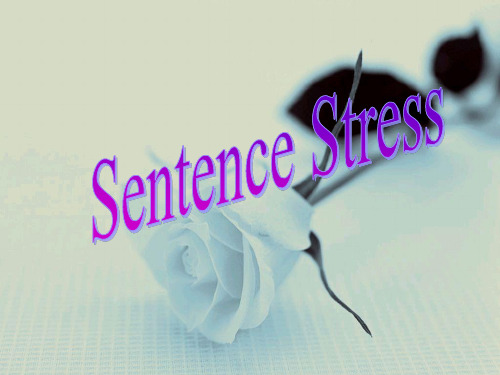
Notional words accentuation, function words weak reading “实词重读,虚词弱读” • eg: • He is a 'teacher.(teacher是名词,要重读) The 'streets are 'wide and 'clean. (这句话中 的streets是名词,wide和clean是形容词,它 们都要重读;the, are, and不重读。) I am 'so 'glad to 'see you 'again. (这句话中 的so, glad, see, again要重读,而I, am, to, you不重读。)
4.Notional verb in a sentence repeated use(实意动词 在句中反复实用) 5.street 在专有名词中 Wangfujing Street 6.this在这些短语中,this morning/afternoon/evening
Sometimes function words are stressed: (有时候虚词也需要重读)
• 名词一般都重读 ,但是一些含义较广,本身没有很确切内 容的名词,如thing, person, place, 或指一大类人或事物的名词,如 man, woman, fellow, time, ship,前面有修饰语缩小其范围时,这类名词通常不 重读 e.g:'That’s a 'nice thing. It’s al'ready 'lunch time.
Basic Rules Of Sentence Stress:
• .The sentence should be stressed words are usually:most notional words(大部分 实词),interrogative words(句首的疑问 词),demonstrative pronouns(指示代 词),possessive pronouns(名词性物主代 词)。Most notional words(大部分的实词) include nouns, verbs, adjectives, adverbs,numeral等。 • unstressed words typically are pronouns(代词),prepositions(介词), articles(冠词), conjunctions(连词).
新概念英语第二册Lesson23(共5PPT) (3)

The fifth slide concludes the lesson by summarizing the key points covered.
The fourth slide emphasizes the importance of reading and gives suggestions on how to read effectively.
PART 03
text analysis
Sentence structure analysis
总结词
掌握句子结构
详细描述
通过分析句子的主语、谓语、宾语、定语、状语等成分,以及句子的基本结构 ,帮助学生更好地理解句子的意思和功能,提高阅读理解能力。
Analysis of long and difficult sentences
Pronunciation is crucial because it affects how others perceive you and your ability to understand native speakers.
A good vocabulary allows you to express yourself more clearly and precisely in English.
Words and expressions
01
02
03
04
05
Learning English is important because it is a global language that is widely used in business, tourism, and international communication.
Sentence stress
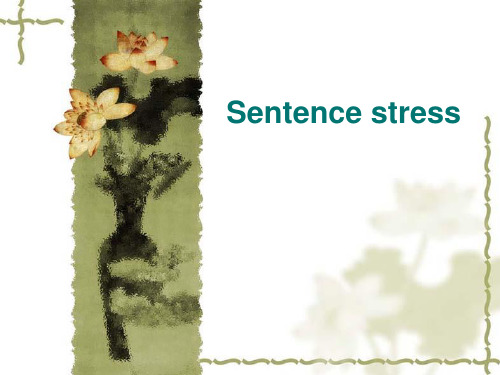
Eg. I could `hardly `believe my `eyes.
2. To serve as the basis for the rhythmical structure of the sentence. The rhythm of English speech is formed by the recurrence of stressed syllables at more or less regular intervals of time and the alternation of stressed and unstressed syllables.
prepositions articles
he, we, they, her, his, myself, each other, that
on, at, into a, an, the
conjunctions
Auxiliary and modal verbs
and, but, because
do, be, have, can, must
1. any word in a sentence may be logically stressed if it implies special emphasis or contrast.
Sentence stress I `bought a `new `book in the `bookstore `yesterday. I bought a new book in the bookstore yesterday I bought a new book in the bookstore yesterday I bought a new book in the bookstore yesterday I bought a new book in the bookstore yesterday I ought a new book in the bookstore yesterday
Sentence Stress in English
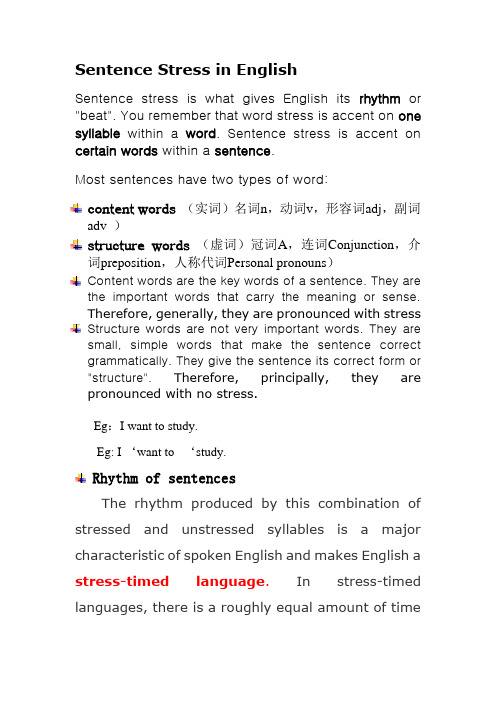
Sentence Stress in EnglishSentence stress is what gives English its rhythm or "beat". You remember that word stress is accent on one syllable within a word. Sentence stress is accent on certain words within a sentence.Most sentences have two types of word:content words(实词)名词n,动词v,形容词adj,副词adv )structure words(虚词)冠词A,连词Conjunction,介词preposition,人称代词Personal pronouns)Content words are the key words of a sentence. They are the important words that carry the meaning or sense. Therefore, generally, they are pronounced with stressStructure words are not very important words. They are small, simple words that make the sentence correct grammatically. They give the sentence its correct form or "structure".Therefore, principally, they are pronounced with no stress.Eg:I want to study.Eg: I ‘want to ‘study.Rhythm of sentencesbetween each stress in a sentence, compared with a syllable-timed language (such as French, Turkish and West Indian English) in which syllables are produced at a steady rate which is unaffected by stress differences. Sentence stress is an important factor in fluency, as English spoken with only strong forms has the wrong rhythm, sounds unnatural and does not help the listener to distinguish emphasis or meaning.E.g. Will you ‘sell my ‘car because I’ve ‘gone to ‘FranceIn our sentence, the 4 key words (sell, car, gone, France) are accentuated or stressed.Why is this important for pronunciation? It is important because it adds "music" to the language. It is the rhythm of the English language. It changes the speed at which we speak (and listen to) the language. The time between each stressed word is the same.E.g.will yo u︱‘sell my︱‘car because I’ve︱‘gone to ‘FranceIn our sentence, there is 1 syllable between SELL and CAR and 3 syllables between CAR and GONE. But the time (t) between SELL and CAR and between CAR and GONE is the same. We maintain a constant beat on the stressed words.To do this, we say "my" more slowly, and "because I've" more quickly. We change the speed of the small structure words so that the rhythm of the key content words stays the same.。
Sentence Stress
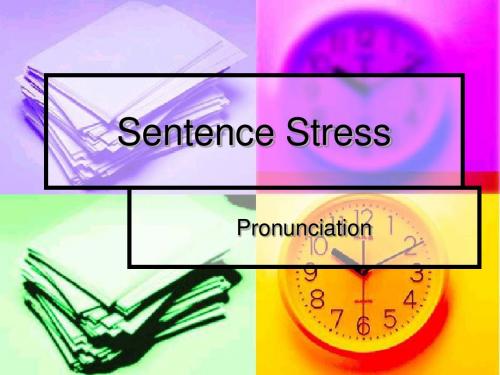
7
Read the following sentence aloud: The beautiful Mountain appeared transfixed in the distance. 大声读下面句子:The 大声读下面句子:The beautiful Mountain appeared transfixed in the distance.
1
Learn the following rules concerning pronunciation. 学习下面有关发音的规则。
2
English is considered a stressed language while many other languages are considered syllabic. 许多其他语言被认为是音节语 言,而英语被认为是重读语言。
13
Be surprised at how quickly your pronunciation improves! By focusing on stressed words, nonnon-stressed words and syllables take on their more muted nature. 通过强调重读词,把非重读词 或音节用近乎无声地快速读出 来,你将为如此快速地提高你 的发音而感到惊奇!
9
Notice that the first sentence actually takes about the same time to speak well! 注意第一句和第二句几乎用同 样长的时间读完。
10
Even though the second sentence is approximately 30% longer than the first, the sentences take the same time to speak. This is because there are 5 stressed words in each sentence. 虽然第二句比第一句长30%左 虽然第二句比第一句长30%左 右,但是两句读完的时间一样。 这是因为每句中都有5 这是因为每句中都有5个重读词。
Sentence stress-English Pronunciation and Intonation for Communication英语语音练习

English Pronunciation and IntonationUnit 1•When we learn to speak En glish,/ we are lear ning a new way of li stening and spea king./ The pur pose of this text book/ is to try to make your ears shar per/ for the sounds of En glish/ and the way the sounds are or ganized;/ to help you get fa mi liar with pitch move ments of En glish u tterances/ and the me ssage it con veys;/ and to help you im prove your En glish pronunci a tion and into na tion./ When you can hear En glish pro perly/ you will be a ble to im prove your spo ken En glish./•In words with two or more sy llables in En glish,/ one of the sy llables will re ceive more stress than the o thers./ Look up these words in the dic tionary/ and you will see a mark indi ca ting stress/in front of this sy llable./ Peo ple o ften have di fficulty under stan ding these words/ if the stress is wrong/ because a word is con si dered mispro nounced/ if the wrong sy llable stress is used./ Co rrect stress is,/ therefore,/ as im por tant as co rrect sounds./Unit 2Fast food•Fast-food re staurants are ve ry po pular/ because the ser vice is fast/and the food is inex pen sive./ For many peo ple,/ this is more im por tant than the qua lity of the food./ These re staurants are al so po pular/ because the food is al ways the same./ Peo ple know/ that if they eat at a com pany’s re staurant/ in the north or south of the ci ty,/ the food will be the same./ If they eat in New York or London,/ it will still be the same./•Fast ser vice and low cost are im por tant in the U ni ted States./ One rea son is/ that about 50 per cent of all ma rried wo men with chil dren/ work out side the home./ They are too bu sy and too ti red/ to cook di nner e very night./Unit 3Slow Food•I ta lians know and love good food./ It’s at the heart of their cul ture./ They don’t like to rush through meals, ei ther./•In 1986,/ some thing ha ppened in I taly. /A Mc Do nald’s o pened in Rome./Many I ta lians were sur prised and an gry./ They thought,/ “This is an a ttack on I ta lian cul ture!”/ One man,/ Carl Pe tri ni,/ de ci ded to fight back./ “Fast food is the e nemy,”/ he said./ He star ted a group called Slow Food./ To day,/ about 80,000peo ple from over 100coun tries/ be long to the group./ It be gan as a hu morous but de ter mined a ttempt/to pre serve I ta lian foods/and su pport small re staurants/ from the pre ssures of inter na tional fast food com panies./ It has grown into an inter na tional move ment/ to pre serve lo cal foods and cu linary tra di tions/ and to con serve agri cul tural biodi ver sity. / •Fast food is rea ching more and more parts of the world./ But Slow Food is ge tting its me ssage to more and more peo ple, too./Unit 4The English Dictionary•How many words are there in the En glish dic tionary? If you had asked that que stion in 1806, the an swer would have been 28,000. In 1822, the an swer would have been 70,000. To day the que stion is di fficult to an swer because there are many kinds of dic tionaries. The num ber of words de pends on how in clu sive the dic tionary is. For e xam ple, there are a ppa rently some onemi llion in sects al rea dy de scribed, with se veral mi llion more a wai ting de scrip tion. It is in deed hard to see how e ven a con ser vative e stimate of En glish vo ca bulary could go much below a mi llion words. A com plete ande xhau stive En glish dic tionary to day, therefore, would pro bably con tainaround 650,000words. Don’t wo rry, though, few peo ple use more than 60,000words!Unit 5Electric Cars•Peo ple were in terested in ma king e le ctric cars/ as ear ly as the 1840s./ One small e le ctric car was made then,/ but it di dn’t work well./ Then, in 1912,/ Ge neral Mo tors pro duced an e le ctric truck./ These e le ctric ve hicles were of course not made for the pu blic to buy./•Ge neral Mo tors was the first to try a gain in the last de cade./ It was a big cha llenge./ An e le ctric car needs a ba ttery./ But the ba tteries are hea vy/ and don’t work well./ None of them could pow er a car far e nough or longe nough./ And the new tech no logy cost a lot./•They did suc ceed fi nally./ The car they built was called the EV1/ and it be came a vai lable in Cali for nia in 1998./ It was the first e le ctric car de signedand sold/ by a large au tomobile com pany./Unit 6Folklore – Stories of Cultures Past•Folk lore is the stu dy of cul ture and hi story/ that is passed on/ through o ral li terature./ The word“o ral” means re la ting to the mouth,/ es pe cially the spo ken word./ O ral li terature in cludes sto ries, poems, and songs/ that are passed on/by word of mouth./ They are passed between fa mily mem bers and re sidents of vi llages,/ and from one gene ra tion to the next./ Before wri tten lan guage and books,/ and long before com pu ters,/ peo ple passed infor ma tion o rally/ – by te lling sto ries and sing ing songs./ In some parts of the world,/ the o ral tra di tion is still the pri mary way of communi ca tion./ •There are ma ny di fferent pur poses of these songs and sto ries./ Some sto ries and songs taught re li gious be liefs;/ o thers ce lebrated ro mance and the triumph of good over evil. Still o thers gave im por tant mo ral le ssons,/ es pe cially to chil dren./ Ma ny of these sto ries con tained super na turale lements/ like fai ries, wi tches and ma gic spells./Unit 7Your Sense of Taste•Taste is one of our five sen ses./ The o thers are hea ring, sight, touch, and smell./ You hear with your ears,/ you see with your eyes,/ and you taste things with your tongue./•On your tongue,/ you have groups of ti ny taste buds. Taste buds send infor ma tion about food to your brain./ You have a lot of taste buds,/ may bee ven 10,000!/ Peo ple don’t have the same num ber of them./ Wo men o ftenhave more taste buds than men./•Because of your taste buds,/ foods like ice cream and ba na nas taste sweet./ French fries,/ cheese,/ and o cean water taste sal ty./ Le mons have a sour taste,/ and co ffee is bi tter./ We all know about these four main tastes:/ sweet, sal ty, sour, and bi tter./•Why does a sense of taste ma tter?/ For one thing,/ it helps peo ple de cide on safe things to eat./ And of course,/ thanks to your sense of taste,/ you can en joy all your fa vorite foods./Unit 8Rainforests – Wonders of Nature•Tro pical rain forests/ are one of the earth’s ri chest/ and most fasci na tinga reas./ They are found in eigh ty-five coun tries in the world./ These damp,dense fo rests/ thrive in Cen tral and South A me rica,/Aus tra lia,/ and South east A sia./ Although these a reas co ver just about ten per cent of the earth’s sur face,/ over for ty per cent of the world’s plant and a nimal spe cies/ are found in the rain forests. /Ma ny of them are found no where else on earth./•The rain forest are ve ry im por tant to the world./ It ac tually con tri butes to the cli mate of the a reas/ in which they live,/ hel ping to su stain rain fall. /The thick trees al so help turn car bon dioxide into o xygen,/ which is ne cessary for hu mans to live./ It is be lieved/that the rain forests con tain im por tant plants/ that will cure the se rious and dead ly di sea ses of to day./ •Because of its vi tal contri bu tion to the en vi ronment,/ and its li mitless possi bi lities for scien ti fic dis co very,/ preser va tion of the rain forest should bea pri o rity for peo ple world wide./Unit 9Giving a Man a Fish•There is an old say ing:/ “Give a man a fish;/ you have fed him for to day./ Teach a man to fish,/ and you have fed him for a life time.”/ This say ing,/ how e ver,/ may no lon ger be true to day./ The rea son is over fi shing./ •The pro blem of over fi shing is sprea ding./ Since a nyone can fish,/ ma ny peo ple do./ Around the world,/ the num ber of fi shermen and fish far mers is grow ing./ The to tal has more than dou bled in the past25years./ •When too ma ny peo ple fish,/ too ma ny fish are caught./ The days of tea ching peo ple to fish may be o ver./ New so lu tions to this pro blem must be found,/ before there are no more fish to eat./Unit 10A Big Head and a Big Mouth•An i diom is a group of words with a spe cial mea ning./ The words in thei diom do not have their u sual, or dinary mea nings./ Eng lish is full of i dioms./You know some al rea dy,/ and you will cer tainly learn more./ •Ma ny i dioms men tion parts of the bo dy:/ the head,/ the hands,/ the heart,/ and so on./ You might hear a girl say,/ “My bro ther’s ge tting a big head.”/ The boy’s head i sn’t grow ing!/ A big head is an i diom:/ this boy thinks/ he isve ry im por tant and spe cial./ His si ster doe sn’t think he is./ She says/that he’s ge tting too con fident./• A friend might tell you,/ “Be care ful./ That girl has a big mouth.”/ The li teral mea ning is/ That girl’s mouth is large./ How e ver,/ have a big mouth is al so an i diom./ Your friend means/the girl talks too much/ or she tells o ther peo ple’s se crets./ Your friend is gi ving you some ad vice:/ You shoul dn’t tell that girl a ny pri vate infor ma tion./ You can’t trust her to keep quiet./Unit 11Comfort Food•It’s na tural for peo ple to eat/ when they’re hun gry./ But peo ple eat for o ther rea sons, /too./ Do you e ver eat/ because you’re with friends/ and e veryone el se is ea ting?/ Do you e ver eat/ because you feel ti red,/ or because you are un der stress?/ Ma ny peo ple do./ Peo ple o ften eat to feel be tter./ When peo ple eat to feel be tter,/ they don’t eat just a nything. /They want spe ci fic kinds of food./ They want food that helps them re lax./ They want com fort food./ •What is com fort food?/ For most peo ple,/ it’s food that is ea sy to pre pare./ It is o ften soft,/ so it is ea sy to eat./ Ea ting it gives peo ple a warm fee ling./Some times it is a type of food/ that peo ple loved as chil dren./ May be they used to eat it/ at spe ci fic times or pla ces./ May be it is food/ their mo ther used to make./ Com fort food makes peo ple feel/ “Some body’s ta king care of me.”/•Yes./ Peo ple eat to feel be tter./ But more o ften,/ they eat com fort foods/ when they al rea dy feel ha ppy./ They eat them to ce lebrate or re ward them selves./Unit 12A Myth – a Cultural Story• A myth is a com plicated cul tural sto ry./ It de scribes the be gin nings and o ther ba sic parts of a cul ture./ Myths tell,/ for e xam ple, /how the world be gan,/ how peo ple and a nimals were cre a ted,/ and how cer tain cu stoms star ted./ •Myths are not the same as fai ry tales./ Myths u sually talk about a time before hi story, /or be fore the world be gan. /They are more se rious and more super na tural than fai ry tales./ Their pur pose is not on ly to enter tain peo ple,/ but to teach them about the foun da tion of a cul ture./•Myths are o ften thought of as re li gious sto ries, /because they talk about gods and o ther super na tural be ings./ How e ver,/ myths go beyond re li gious be liefs./ There fore,/ they can tell us about ma ny parts of hu man life and cul ture,/ notjust re li gion./Unit 13Selling an Old House• A man was ti red of li ving in his old house in the coun try/ and wan ted to sell it and buy a be tter one./ He a ttemp ted to sell it for a long time,/ but was not suc cess ful,/ so at last he de ci ded to solve the pro blem /by u sing a real estatea gent./•The a gent prompt ly ad vertised the house and a few days la ter,/ the ow ner saw a ve ry a ttrac tive pho tograph of the house,/ with a won derful de scrip tion of its gar dens,/ in an ex pen sive maga zine./•Af ter he read the ad ver tisement through,/ the house ow ner ha stened to te lephone the real estate a gent./ “I’m so rry,/ Mr. Jones,”/ said the man,/ “ but I’ve de ci ded not to sell my house after all./ Do you know why?/ After rea ding your ad ver tisement in that maga zine,/ I can see/ that it’s e xact ly the kind of house/ I’ve wan ted to live in all my life.”/。
高中英语Unit 23 Conflict Lesson 2 Living in a Communit
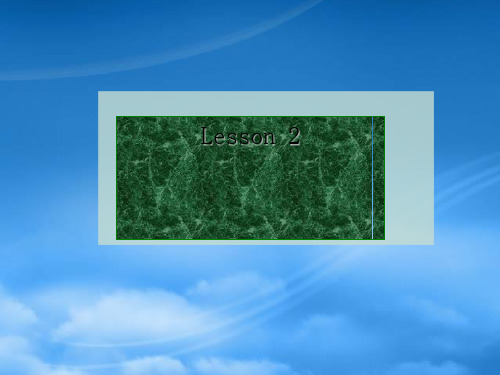
1.Not only has the newspapaer receive calls from angry students, letters of petition have been sent to the local council. 2.No sooner had they moved in than the noise began. 3.Rarely did they get a full night’s sleep.
a)They begin with a word that has a negative meaning. b)They have the word order of a que4stion(inversion). c)They sound less emphatic.
Answers:a) b)
Exercise 8
Find sentences in the texts thagt mean almost the same as the sentences below.
1.Yang Ming feels upset about the fact that people have branded his music “noise”. 2.This really gets to me. 3.People are often not getting enough sleep, however. 4.We gave Yang Ming a warning after careful consideration.
a)What are the effects of not getting enough sleep? b)How many hours do you sleep a week? c)How many hours a week do you study outside of class? d)Do you think you have a good balance between sleeping and studying?
Unit23重点、难点
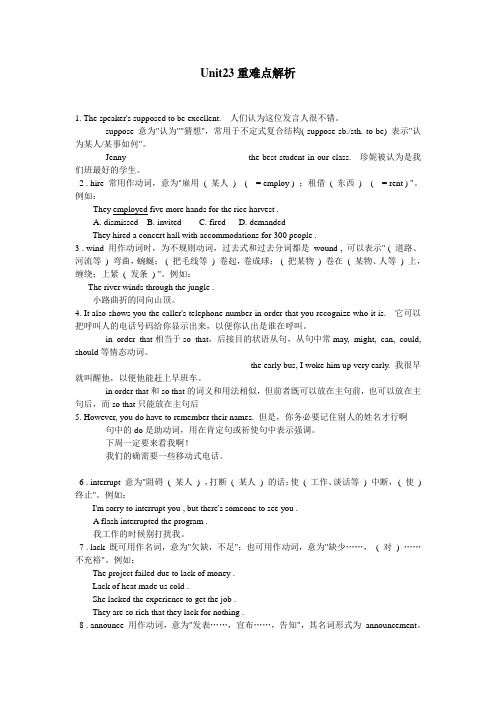
Unit23重难点解析1. The speaker's supposed to be excellent. 人们认为这位发言人很不错。
suppose 意为"认为""猜想",常用于不定式复合结构( suppose sb./sth. to be) 表示"认为某人/某事如何"。
Jenny ____ _______ _____ ______ the best student in our class. 珍妮被认为是我们班最好的学生。
2 . hire 常用作动词,意为"雇用( 某人) ( = employ ) ;租借( 东西) ( = rent ) "。
例如:They employed five more hands for the rice harvest .A. dismissedB. invitedC. firedD. demandedThey hired a concert hall with accommodations for 300 people .3 . wind 用作动词时,为不规则动词,过去式和过去分词都是wound , 可以表示" ( 道路、河流等) 弯曲,蜿蜒;( 把毛线等) 卷起,卷成球;( 把某物) 卷在( 某物、人等) 上,缠绕;上紧( 发条) "。
例如:The river winds through the jungle .小路曲折的同向山顶。
___________________________________________________ 4. It also shows you the caller's telephone number in order that you recognize who it is. 它可以把呼叫人的电话号码给你显示出来,以便你认出是谁在呼叫。
高中英语Unit 23 Conflict Lesson 2 Living in a Communit
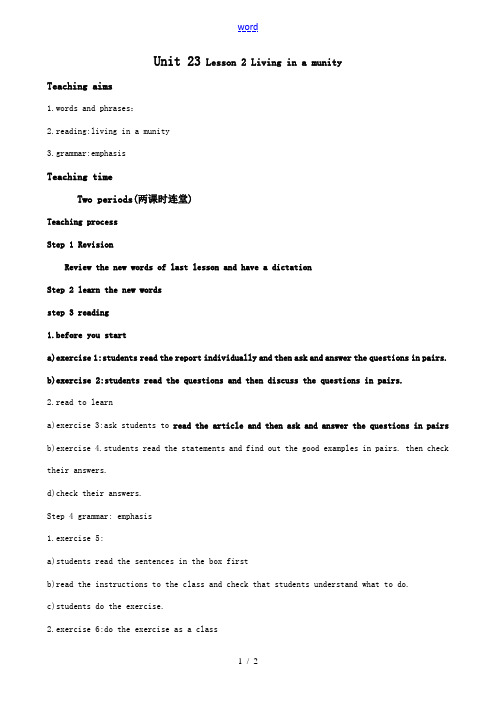
Unit 23 Lesson 2 Living in a munityTeaching aims1.words and phrases:2.reading:living in a munity3.grammar:emphasisTeaching timeTwo periods(两课时连堂)Teaching processStep 1 RevisionReview the new words of last lesson and have a dictationStep 2 learn the new wordsstep 3 reading1.before you starta)exercise 1:students read the report individually and then ask and answer the questions in pairs.b)exercise 2:students read the questions and then discuss the questions in pairs.2.read to learna)exercise 3:ask students to read the article and then ask and answer the questions in pairsb)exercise 4.students read the statements and find out the good examples in pairs. then check their answers.d)check their answers.Step 4 grammar: emphasis1.exercise 5:a)students read the sentences in the box firstb)read the instructions to the class and check that students understand what to do.c)students do the exercise.2.exercise 6:do the exercise as a class3.exercise 7:ask students to do the exercise first, then check their answers. and let them read the sentences out.4.exercise 8.a)let some students read out the example item.b)then students do the exercise in pairsc)check their answers and ask them to read out the sentences.5.ask some students to do exercise 9 on the blackboard and then check their answers.6.let students do exercise 10 individually, pleting the sentences.And then check their answers, have them read out the sentences.7.exercise 11. students do the exercise individually, rewriting the sentences. and then check their answers.step 5 HomeworkExercise 3 in page 68。
3.sentence stress 句子重音

book, paper, idea
Notional verbs(实义动词): walk, dance, travel
Adjectives(形容词):
pretty, cool, bright
well, bravely
Numerals(数词):
four, 10th, first
Hello, I'm John. What's your name?
bread and butter
---Did you say “bread”? ---I said “bread and butter”.
总20之2意1,/1思0在/1。0话语中,句子的重音主要取决于说话人的意愿和他希望表达的 13
StressedWords&UnstressedWordsi naSentence
2021/10/10
1
I shall have to try and get some cash from our bank at lunchtime.
I shall have to try and get some cash from our bank at lunchtime.
They express the main idea or content of the phrase or sentence.
They carry the message and therefore usually stressed.
2021/10/10
7
Content words
Nouns(名词):
nouns, notional verbs, adjectives, adverbs, numerals, interrogative pronouns, and demonstrative pronouns.
sentence stress的概念
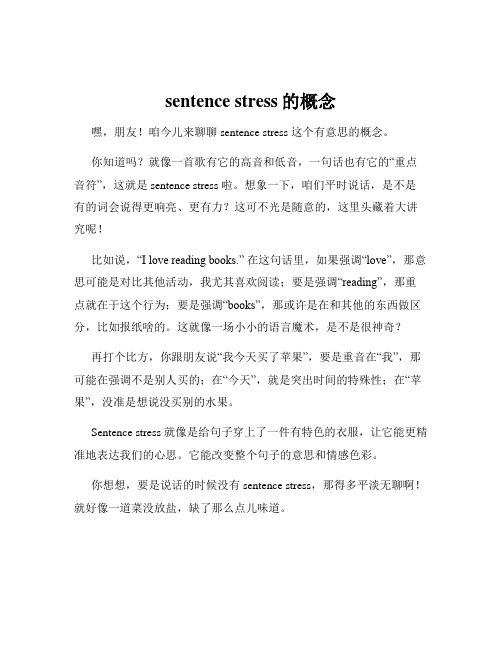
sentence stress的概念嘿,朋友!咱今儿来聊聊 sentence stress 这个有意思的概念。
你知道吗?就像一首歌有它的高音和低音,一句话也有它的“重点音符”,这就是 sentence stress 啦。
想象一下,咱们平时说话,是不是有的词会说得更响亮、更有力?这可不光是随意的,这里头藏着大讲究呢!比如说,“I love reading books.” 在这句话里,如果强调“love”,那意思可能是对比其他活动,我尤其喜欢阅读;要是强调“reading”,那重点就在于这个行为;要是强调“books”,那或许是在和其他的东西做区分,比如报纸啥的。
这就像一场小小的语言魔术,是不是很神奇?再打个比方,你跟朋友说“我今天买了苹果”,要是重音在“我”,那可能在强调不是别人买的;在“今天”,就是突出时间的特殊性;在“苹果”,没准是想说没买别的水果。
Sentence stress 就像是给句子穿上了一件有特色的衣服,让它能更精准地表达我们的心思。
它能改变整个句子的意思和情感色彩。
你想想,要是说话的时候没有 sentence stress,那得多平淡无聊啊!就好像一道菜没放盐,缺了那么点儿味道。
比如说老师上课提问,“谁知道这道题的答案?”如果重音在“谁”,那重点就是在问哪个人知道;要是重音在“答案”,那关心的就是答案本身啦。
又比如,你跟别人介绍自己的工作,“我是一名老师。
”重音在“我”,强调是自己不是别人;在“老师”,那就是突出职业身份。
所以啊,sentence stress 可重要了,它能让我们的交流更清楚、更生动、更有感染力。
学会了它,就像掌握了一门语言的小窍门,能让咱们在说话和表达的时候更加得心应手。
咱可不能小瞧了这 sentence stress ,它能让咱们的语言变得丰富多彩,就像给黑白的画涂上了绚丽的色彩。
你说是不是?总之,sentence stress 是语言中一个非常有趣且实用的概念,多去注意和运用它,咱们的表达就能更精彩!。
- 1、下载文档前请自行甄别文档内容的完整性,平台不提供额外的编辑、内容补充、找答案等附加服务。
- 2、"仅部分预览"的文档,不可在线预览部分如存在完整性等问题,可反馈申请退款(可完整预览的文档不适用该条件!)。
- 3、如文档侵犯您的权益,请联系客服反馈,我们会尽快为您处理(人工客服工作时间:9:00-18:30)。
• Pronouns: • 3. Possessive pronouns(物主代词) • Stressed when not followed by a noun: e.g. mine, yours, his, hers, ours, theirs • e.g. That ticket’s mine. • This is yours. • Barbara got hers. • David sold his. • We bought ours yesterday. • They gave theirs away.
• 【比较:
•
Unstressed when followed by a noun (except for emphasis) : e.g. my, your, his, her, our, their • My car. Your friend. • His brother. Her dress. • Our house. Their camera.】
• • • 【比较:
cut myself.), reciprocal pronouns (相互代词,unstressed. E.g. They like each other.) (see exercise 1.3)】
reflexive pronouns (反身代词,unstressed. E.g. I’ve
have you been there? – Three times) (The "boys
"shouted to other boys.) (see exercise 2.1-2.6)
Function Words
• Function words are usually unstressed in a sentence. • But there are some exceptions:
• [比较:Stressed: when not followed by a noun: • E.g. What’s this? • That’s Jessica’s ball. • Why are these here? • We wanted those. ]
• Sentence containing repeated words: when a sentence contains a word that has just been used, that word is generally unstressed. (e.g. –"How "many "times
• Auxiliaries 助动词: • 1. the affirmative forms (肯定形式) of ‘be’ and auxiliary verbs(助动词) are stressed in tag questions(附加疑问句) (e.g. She isn’t a doctor, is she?) • and may be stressed at the beginning of questions (e.g. Have you finished?) (see exercise 1.5); • Modal auxiliaries 情态动词: • 2. ‘may’ & ‘might’ are stressed when indicating possibility (e.g. This may or may not be true. ) (see exercise 1.7).
• Conjunctions: when the conjunctions have an emphatic meaning (e.g. although, even if/though), they are stressed. (see exercise 1.8)
ห้องสมุดไป่ตู้
• Pronouns:
• 1. emphatic pronouns (强调势代词,stressed. E.g. I "locked
it myself.) (see exercise 1.2),
• 2. compound pronouns(复合代词,’nobody’ & ‘nothing’ are stressed; ‘somebody, someone, something, anybody, anyone, anything’ are stressed when they subjects, unstressed when they are objects.) (see exercise 1.4)
"house has "many rooms and there is a "lovely garden. see exercise 1.6)
• Demonstratives: e.g. this, that, these, those • Unstressed: when followed by a noun. (except for emphasis) • E.g. She bought that house. • We like these shoes. • Those boys talk too loud. • This book is interesting.
Unit 23 Sentence Stress in English (II)
Content Words
• Content words are usually 通常 stressed in a sentence. • But there are some exceptions 例外:
• Nouns: the word ‘street’ in street names is unstressed (e.g. Bridge Street, North Street see exercise 1.1) (cf. "York Road) • Adverbs: ‘There’ in ‘there to be’ is unstressed. (e.g. The
